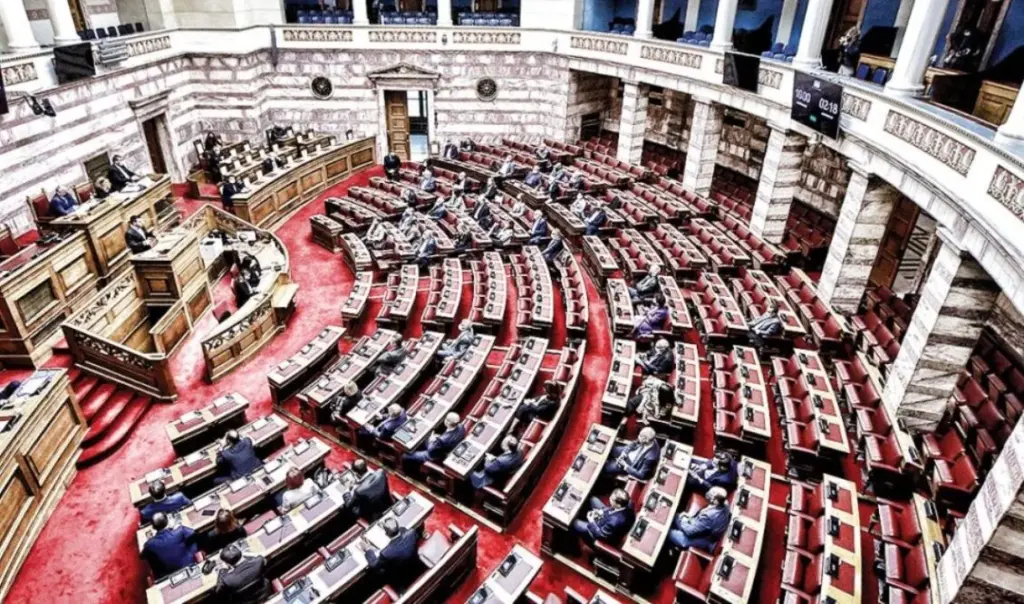Re-election anxiety grips incumbent members of parliament from New Democracy across the country, with the ruling party’s polling stagnation below the 30% threshold creating new dynamics and overturning correlations on the road to the 2027 ballot box. Reading the measurements, everyone realizes that the 158 seats from the 2023 elections seem like an unattainable dream, with the apparent shrinkage of the “blue” parliamentary group in the next elections making the situation extremely pressuring for MPs from Thessaloniki and the Greek periphery, where, based on the percentages of recent measurements, several current MPs may bid farewell to their parliamentary seats.
Thessaloniki A becomes a “black hole” for New Democracy in 2023
In the 2023 national elections, the electoral district of Thessaloniki A became a “black hole” for New Democracy, recording significantly lower percentages than the national level (35.28%), electing eight MPs in the first district of the co-capital, including Prime Minister Kyriakos Mitsotakis, who secured that particular seat. With the ruling party now having a “ceiling” of 30% according to current measurements, things become difficult for the former stronghold of the center-right faction, which in recent electoral contests shows symptoms of “Athenization,” recording notable loss of “blue” dynamism. With a percentage around 28%-30%, New Democracy would elect up to 4 MPs, with the ranking based on preference votes from 2023 foretelling a “massacre” among the North’s first-tier candidates.
In the first district of the co-capital, a quartet of deputy ministers stands out, followed by… absolute chaos: Deputy Development Minister Stavros Kalafatis with 34,551 votes in the last national elections, Deputy Minister for Macedonia-Thrace Kostas Gkioulekas with 32,292 votes, Deputy Minister for Social Cohesion and Family Elena Rapti with 30,513 votes, and Deputy Labor Minister Anna Efthymiou with 22,773 votes. Beyond that, MPs Dimitris Kouvelas, Stratos Simopoulos, and Diamantis Gkolidakis are fighting for survival, playing “by the vote,” while considering the rumors, the equation seems to include Deputy Minister for Education, Religious Affairs and Sports Nikos Papaioannou, Prime Minister’s office coordinator Giannis Papageorgiou, and State MP Nefeli Chatziioanidou. Thus, the upcoming preference vote battle promises to be difficult even for very strong candidates.
Thessaloniki B loses one seat
Similarly, in Thessaloniki B, where Dimitris Vartzopoulos, Theodoros Karaoglou, and Fanis Papas are elected in order, it appears New Democracy loses one seat, however Mr. Karaoglou’s desire to contest the Central Macedonia Region in 2028 could bring serious changes to correlations ahead of the next parliamentary elections.
The four-seat districts
More worrying is the situation for New Democracy MPs in the 13 four-seat districts nationwide, where estimates show that the 3-1 that New Democracy had achieved, let alone the probable 4 out of 4, is extremely difficult to achieve again. Conversely, in single-seat districts the system operates by majority, while in two-seat districts the seats are shared between the first two parties.
In this context, in Evros Prefecture, Deputy Minister for Digital Governance Christos Dermentzópoulos doesn’t appear to be in danger, however the battle for second place, with current data, will be fought between Stavros Keletsis and Tasos Dimoschakis, with the former having an advantage based on the preference votes from the last elections. In Kavala, former minister Nikos Panagiotopoulos with 26,269 votes is safe, with Giannis Paschalidis and Makarios Lazaridis following, however the fourth seat taken by Angeliki Delikari is difficult to maintain in the next national elections. In Pella, former deputy minister Dionysis Stamenitsis and Lakis Vasiliadis have an advantage for the two seats New Democracy appears to be getting, while Giorgos Karasmanis, who is third in the ranking order, will fight for his re-election. Things look difficult in Pieria, where New Democracy might elect one MP instead of the three it has today, and Fontas Baraliakos (first in preference votes), Anna Mani-Papadimitriou, and Spyros Koulkoudinas will contest the seat. Similarly, in Trikala, New Democracy secretary Kostas Skrekas appears favored for the first seat, but if New Democracy elects two MPs, Thanasis Lioutas and Katerina Papakosta will give a tough battle for re-entry to Parliament.
In Karditsa, the absolute four-seat sweep currently seems unlikely, with New Democracy appearing to lose one seat and Asimina Skondra and Telis Spanias “playing” for the third seat, as Agriculture and Food Minister Kostas Tsiaras and Giorgos Kotsos don’t seem to face problems.
The Peloponnese and the battle in Messenia
In the Peloponnese, Messenia has five seats, while Arcadia and Argolida are three-seat districts where New Democracy, PASOK, and SYRIZA each elect one MP, and Laconia where New Democracy takes two seats and PASOK one. In Messenia, the 4-1 doesn’t reflect the scenario recorded by polling surveys, therefore MPs Miltos Chrysomallis (first in votes in 2023), Giannis Lambropoulos, and Periklis Mantas will battle for Parliament entry.
In Corinthia, the possibility of a third seat is receding, with Marilena Soukouli -according to data from measurements and 2023 preference votes- appearing unlikely to be re-elected, like Markos Kafouros in the Cyclades, if New Democracy loses the four seats it won in the last elections. In Achaia, where 9 MPs are elected, New Democracy had 3 seats, but if it loses one MP, Deputy Culture Minister Iason Fotilas is at risk. A similar issue faces Mika Iatridou and Vasilis Ypsilantis in the Dodecanese, where two seats emerge, Konstantina Karabatsoli in Evia, and Maximos Charakopoulos in Larissa. It’s worth noting that in the last parliamentary elections, New Democracy managed to prevail in all single-seat districts of the country, namely in Thesprotia, Kefalonia, Evrytania, Zakynthos, Grevena, Lefkada, Samos, Kastoria, and Fokida.
Published in Parapolitika




